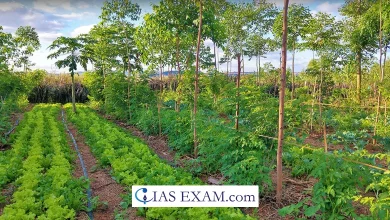Daily Current Affairs for UPSC
HC Stays Suspension of Rajasthan’s Women Sarpanch
[GS Paper 2 – Indian Constitution, Judiciary, PRIs]
Context – The Rajasthan High Court has stayed the suspension order against a woman sarpanch and issued notices to a Minister and an MLA in the State for initiating the action against her.
Provisions Related to Sarpanch in PR Act, Rajasthan
- Removal and Suspension – The State Government may, by order in writing and after giving him an opportunity of being heard and making such enquiry as may be deemed necessary, remove from office any member including a Chairperson or a Deputy Chairperson of a Panchayati Raj Institution, who:
- Refuses to act or becomes incapable of acting as such; or
- is guilty of misconduct in the discharge of duties or any disgraceful conduct.
- The State Government may suspend any member including a Chairperson or a Deputy Chairperson of a Panchayati Raj Institution against whom:
- An enquiry has been initiated under
- Against whom any criminal proceedings in regard to an offence involving moral turpitude are pending trial in a Court of law and such person shall stand debarred from taking part in any act or proceeding of the Panchayati Raj Institution concerned while being under such suspension.
Local Self Government in India
- Panchayati Raj Institution (PRI) is a system of rural local self-government in India. Local Self Government is the management of local affairs by such local bodies who have been elected by the local people.
- PRI was constitutionalized through the 73rd Constitutional Amendment Act, 1992 to build democracy at the grass roots level and was entrusted with the task of rural development in the country.
- In its present form and structure PRI has completed 26 years of existence. However, a lot remains to be done in order to further decentralization and strengthen democracy at the grass root level.
The 73rd Constitutional Amendment Act
- The Act empowered state governments to take the necessary steps that would lead to the formalization of the gram panchayats and help them operate as units of self-governance.
- The Directive Principles of State Policy in the Constitution of India lays down in Article 40 that the government shall facilitate the establishment and smooth functioning of the gram panchayats.
- In order to address these issues and strengthen the local self-governments in India, the central government brought about the 73rd Amendment Act in 1992. The act was passed in both houses and entered into force from 24th April 1993.
- The chief features of the act are mentioned below:
- This Act made the Panchayati Raj institutions in the country constitutional bodies.
- Under Article 243-B, it has become compulsory for every state to establish panchayats in their territories.
- Article 243-G makes it mandatory for the state governments to devolve powers, responsibilities and authority to the panchayats.
- The gram panchayats have a fixed tenure of 5 years.
- State election commissions have been provided with the mechanism to conduct independent elections to the village panchayats.
- Article 243-D gives provisions for the due representation of women and SC/STs.
- The State Finance Commission should also evaluate the financial position of the panchayats every five years.





.png)



